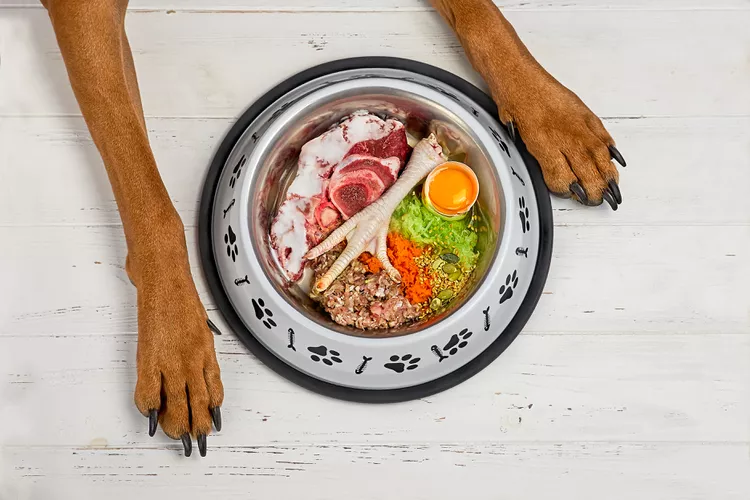The Pros and Cons of a Raw Food Diet for Dogs

Raw food diets have become increasingly popular as alternatives to traditional dog food diets. Alongside many other dog food trends like grain-free, vegan or vegetarian, and the use of novel proteins, raw food diets have their pros and cons. Concern among veterinary professionals specifically lies in the safety of this type of diet while some pet owners and enthusiasts argue a raw diet is a healthier option for dogs.
What Is a Raw Food Diet for Dogs?
A raw food diet is one that does not contain cooked items. Unlike traditional, processed dog food, raw dog food does not come in a kibble or canned form. Freeze-dried and frozen options do exist for dog owners that appreciate convenience but still want to offer raw food. Fresh meat, often still on the bone, along with vegetables, grains, organ meats, eggs, fruit, and even some dairy may be part of a homemade, raw diet. Various recipes can be found online but some dog owners don't follow a recipe.
Why Do People Feed Raw Food Diets to Dogs?
Commercial dog food is nutritionally balanced, convenient, and affordable, yet despite these good qualities, some dog owners prefer raw food diets. A desire to feed more "natural" items, concerns with their dog's health, and trust issues with pet food manufacturers may lead a dog owner to go the raw route. Some owners even feel that since a dog's ancestors ate raw foods in the wild, their domesticated dog should, too.
Some dogs have food sensitivities or allergies that make it difficult to purchase commercially prepared diets. These dogs may benefit from a home-prepared meal and some owners opt to feed raw diets. A veterinary nutritionist should be involved in formulating a complete and balanced diet for a dog, even if a raw food diet is utilized, to ensure key nutrients will not be lacking.
What Nutritional Requirements Does a Dog Have?
Dogs can have different nutritional requirements if they have a specific disease but healthy puppies, adults, and pregnant or nursing dogs all require different things from their food, too. This is why different commercial diets exist for dogs in different life stages and also with different health problems. A six-month-old puppy does not have the same nutritional needs as a dog with kidney disease.
Nutrition affects internal organs, skin and coat, bones, muscles, and other parts of your dog, so it is more complicated than some pet owners may realize. Dogs need various vitamins, minerals, proteins, carbohydrates, fibers, and other ingredients to function normally and be healthy. If an improper diet is fed, dogs can develop serious, life-threatening issues, break bones, and not grow properly.
Dogs are omnivores so their nutritional needs reflect that. The Association of American Feed Control Officials (AAFCO) helps define and regulate what pets need and pet food manufacturers use these guidelines to make their foods. Domestic dogs are genetically different than their wolf ancestors so even though they are both canines, domestic dogs evolved to be able to digest starches.
Pros and Cons of Raw Food Diets for Dogs
More natural ingredients
Ability to choose exactly what your dog eats
Ability to choose the source of your dog food ingredients
Potential for bacterial and parasitic contamination
Potential for nutritional imbalance
Potential for tooth injuries from bones
Expensive
Time consuming to prepare
The biggest concern people have with feeding raw food diets is the potential for bacterial and parasitic contamination and infection, even in previously frozen meats. Raw meats can harbor bacteria like Salmonella, Listeria, and E. coli as well as microscopic parasites like Sarcocystis and Toxoplasma. These pathogens can cause serious infections in both people and pets. Additionally, raw food diets are more expensive than commercially prepared kibble or canned food, can cause tooth injuries if they include bones, and are more time-consuming to prepare.
On the other hand, raw food dog diets allow a pet owner to choose exactly what their dog is eating. They can avoid specific ingredients, know what the sources of the ingredients, and can ensure their dog is getting a more natural diet like a wolf would eat.
Regardless of what type of diet you choose to feed your dog, make sure it is nutritionally complete and balanced. Dogs need more than just raw meat, so a veterinary nutritionist should be involved in formulating your dog's diet to ensure no nutrients are lacking.